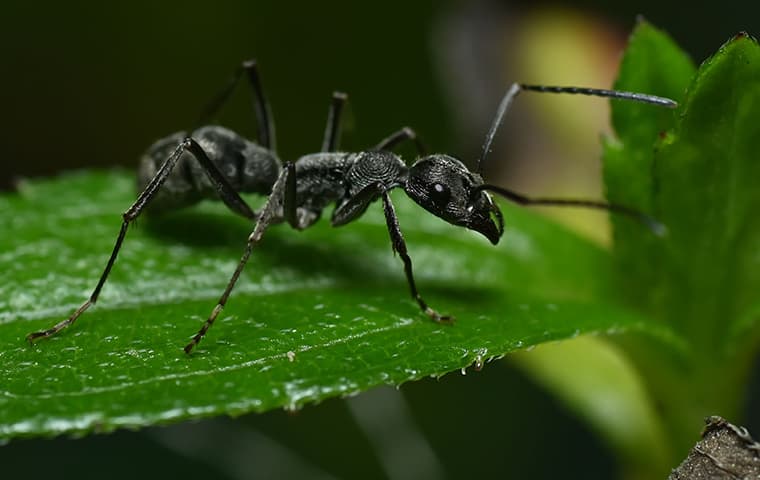
When ants start flooding into your home, questions will start flooding into your mind. What brings ants in? What will they do in your home—other than drive you crazy? How do you get rid of ants? And, perhaps, most importantly, how do you say good riddance to those ants for good? Today, we will cover these inquiries and more as we look at common questions Covington residents ask.
If you want more direct answers regarding ant control in Covington, remember that your Havard Pest Control team is always here to assist you. Call or text us to get answers, or jump over to our residential pest control page to learn about Pest Shield, Pest Shield Gold, and Pest Shield Platinum. These control plans offer wide coverage and competitive pricing for a long list of pests, including common pest ants.
Types Of Ants Common To The Area
The first step in any control plan is knowing the pest you're attempting to control. We get common questions about ant identification, but one we find surprising is, "Do ants have wings?" We deal with ants all the time, so we know that some ants develop wings. We also understand the purpose of those wings.
Male and female winged reproductives take to the air, mate with each other, and start new colonies. If you see winged ants, that is a sign that you're about to have more nests. But, for someone who doesn't know all that much about ants, it is easy to wonder, "Do some ant species have wings, while others don't?" While this misconception won't make ant control harder, knowing why ants have wings can help quite a bit. Let's look at a few more facts to help you understand your ant problems better.
Little Black Ants: If you see many little black ants, you may look up "little black ants" on the internet. If you do, you'll find out that there is a species with this name. But many ants appear little and black. Even carpenter ants, the largest ants that get into Covington homes, can look like little black ants. But all of these species are different. So, knowing what a little black ant looks like and how it behaves is helpful.
Tip: Learn to tell the difference between little black ants, pavement ants, odorous house ants, and carpenter ants. They're all little and black.
Sugar Ants: Several species of ants are attracted to sweet food sources. These ants will scale your walls and climb down strings to get to hummingbird feeders. However, they don't need you to provide a sweet food source. They'll feed on the nectar in flowers and honeydew produced by aphids.
Tip: If you want to get rid of sugar ants, you should consider using naturally sweet foods.
Stinging Ants: One kind of ant presents a unique hazard to public health. We're sure you know what ants we're talking about: Fire ants. A sting from a fire ant can cause an irritating wound with a pustule at the center, but it can also trigger an allergic response for individuals with a stinging insect allergy. You should never allow fire ants to enter your house. The good news is that they don't really want to enter homes but will if the weather becomes severe. They live in the sunny areas of Covington yards. Often, weatherproofing is enough to keep these ants out.
Tip: Check the weatherproofing on your home if you want to say good riddance to ants.
Carpenter Ants: Property damage is a concern when you have a carpenter ant problem. These ants can tunnel in wood to create galleries for their nests. They are attracted to softened wood first. A moisture problem and areas of decaying wood are a target for these ants. But they're not the only ants that moisture issues attract. All ants need moisture for survival.
Tip: Clean your gutters, repair plumbing issues, and manage moisture to keep ants at bay.
Ants in Covington continually apply pressure to your exterior. If you take steps to reduce the factors that attract them and block their ability to enter your house, you'll be on your way to living in an ant-free home. Let's look at a few reasons why it is good to keep ants out.
Ants In The Home Can Create Many Problems
What do ants do in your home, and how bad is an ant problem? There are several factors involved. Let's consider them and link them to ways to say good riddance to ants:
- Ants pick up germs and spread them around because they are as comfortable in your trash as in your kitchen cabinets. Routinely cleaning your home can help deter the spread of germs and make ants less likely to live with you.
- Ants can climb through tiny holes to access packaged food, which can cause contamination. Store these foods in sealed containers to keep ants out of your food and your home.
- Carpenter ants tunnel in wood and can cause significant damage over time. What does carpenter ant damage look like? If you can see into their tunnels, you'll find them stacked on top of each other. They'll also be smooth to the touch, unlike termite tunnels, which are gritty. Maintaining healthy wood will help deter these ants.
- Fire ants sting. If you also know that they are protein eaters, you'll have some idea of how to keep them out of your home. They gravitate to trash, food around your grill, and insects. Manage these, and you'll manage fire ants.
We've shared a few ant prevention tips while examining the different kinds of ants that may get into your home and some of the problems they can cause. Now, let's look at the broader picture and examine five techniques to reduce ant activity and prevent ants from entering your house.
Five Useful Ant Prevention Techniques
You can already give several answers to the question, "How do I keep ants out of my home?" Now, it's time to clarify the techniques so that you have a clear understanding of effective ant prevention tips to keep ants out and keep them out. We'll build on what we've discussed so far.
Reduce Insects
Many ants eat insects, particularly fire ants. A useful tip for reducing insects is to replace exterior white lights with yellow lights. The reason this works is that insects can't see yellow light. Another way to reduce insects is to control moisture. That is where cleaning your gutter comes in.
Reduce Sweet Natural Foods
When weeds start to take over your lawn, ant problems are usually fast to follow. Ants are looking for nectar and the other insects that eat nectar. If you remove the weeds, you deter the pests. Along with this, keep your landscape plants as healthy as possible. Doing so will make them resistant to plant-damaging insects that produce honeydew, like aphids, white flies, and scale insects.
Weatherproofing
There are many ways to seal your home. The most obvious is to replace old weatherstripping, sweeps, and screens. In addition, take time to fill in gaps around pipes, window frames, door frames, damaged wood, wood cavities, and structural voids. The methods you use to keep heated or cooled air from escaping are the same methods that keep ants and other pests out.
Trim Vegetation
Ants like to hang out on plants, and when plants touch your exterior walls, these insects can quickly move from outdoors to indoors in large numbers. Trim plants so that no vegetation touches your exterior walls.
Hide The Food
Food sources on your exterior property aren't the only ones that attract ants. An infestation can start when ants find food indoors. When an ant worker finds food in your home, it will recruit an army. You can prevent this by keeping your home as clean as possible. When ants come in, they leave empty-handed.
You now have the knowledge you need to stop ant problems, equipped with lots of tips to help you do it yourself. Now, let's outline what your pest control service provider can do for you. At Havard Pest Control, we believe this is the key to total ant control.
The Key To Total Ant Control For Your Home
How do professional ant pest control services work? A residential pest control service plan, like Pest Shield, comes with an interior treatment that removes indoor pests that ants can feed on. Once the pests are out, we apply routine exterior treatments four times a year to maintain a pest control barrier to stop ants and other pests. Around your exterior, we perform spot treatments to target and eliminate ant colonies if needed and to control the insects that ants feed on. All these services work together to protect your property against ant infestations and other pest problems.
Are you in Covington? Would you like to learn more about ant and general pest control? Contact Havard Pest Control. We'll help you find the perfect fit for your family and your home.


 Reviews
Reviews





